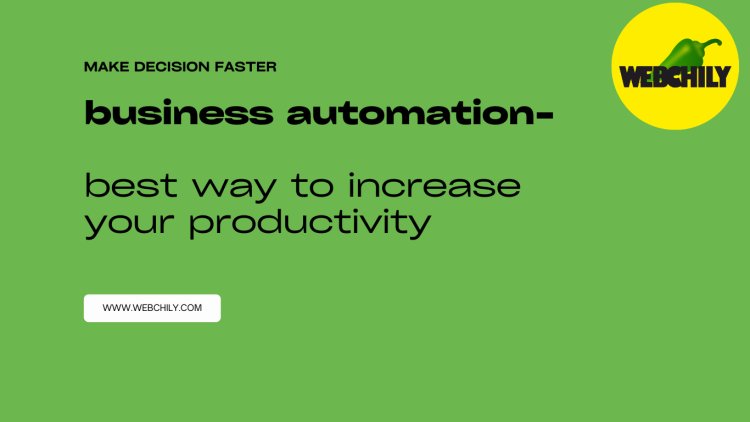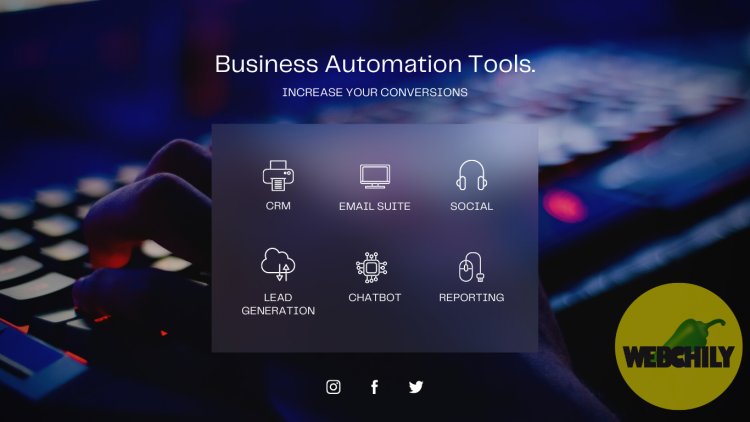A Marketing Automation platform that can do EVERYTHING!
A Marketing Automation platform that can do EVERYTHING! Business Automation and Important Tools to use

What is Business Automation?
Business automation refers to the use of technology to streamline and automate repetitive, manual, and time-consuming business processes. It involves the implementation of software tools and applications that can perform routine tasks, such as data entry, document processing, and communication, without the need for human intervention.
By automating these processes, businesses can increase efficiency, reduce errors, improve accuracy, and free up time for employees to focus on more strategic and value-added tasks. Some common examples of business automation include customer relationship management (CRM) systems, inventory management software, and accounting software.
In addition to improving operational efficiency, you can contact web development companies who does business automation for businesses with valuable insights and analytics that can help them make better decisions and optimize their operations. Overall, business automation is a powerful tool for businesses looking to improve their productivity, reduce costs, and stay competitive in today's rapidly evolving business environment
How to do marketing automation
-
Define your goals: Start by identifying your business objectives and determining what you hope to achieve with marketing automation. This will help you determine which tools and platforms to use and what features you need to focus on.
-
Choose the right platform: Select a marketing automation platform that offers the features and integrations you need to achieve your goals. Popular options include HubSpot,Zapier, WhatsApp Business, Jira, Slak,Asana, Trello, Canva, Zoho,
-
Build your database: Collect data on your prospects and customers to create a comprehensive database. This data should include contact information, demographic data, and behavioral data, such as website visits, social media interactions, and email opens.
-
Create targeted campaigns: Use your marketing automation platform to create targeted campaigns that are tailored to your audience's interests, behaviors, and preferences. This may include email marketing, social media advertising, and content marketing.
-
Monitor and analyze results: Use analytics and reporting features to monitor the performance of your campaigns and track progress toward your goals. Use this data to make informed decisions about future campaigns and optimize your strategy for better results.
-
Continuously optimize: Marketing automation is an ongoing process, and it's important to continuously monitor, test, and optimize your campaigns to improve results over time.
Best suite for Business Automation
There are many business automation tools available, and the best ones for your business will depend on your specific needs and goals. However, here are some popular options that businesses frequently use:
-
Customer Relationship Management (CRM) software: CRM software helps manage customer interactions and data, including sales, marketing, and customer support. Some popular CRM tools include Salesforce, HubSpot, and Zoho.
-
Marketing automation software: Marketing automation software helps automate and streamline marketing tasks such as email campaigns, social media scheduling, and lead generation. Popular options include HubSpot, Marketo, and ActiveCampaign.
-
Project management software: Project management software helps organize and manage tasks, projects, and teams. Some popular options include Asana, Trello, and Monday.com.
-
Accounting software: Accounting software helps manage financial transactions, including invoicing, budgeting, and tax reporting. Some popular options include QuickBooks, Xero, and FreshBooks.
-
Human resources software: Human resources software helps manage employee data, benefits, and performance. Some popular options include BambooHR, ADP, and Zenefits.
-
Inventory management software: Inventory management software helps manage stock levels, orders, and suppliers. Popular options include TradeGecko, Stitch Labs, and Skubana.
-
Customer service software: Customer service software helps manage customer inquiries, complaints, and feedback. Some popular options include Zendesk, Freshdesk, and Help Scout.
Why you need business automation?
Business automation can bring several benefits to a business, including:
-
Increased efficiency: Business automation can streamline manual and repetitive tasks, reducing the amount of time and effort required by employees. This can free up time for employees to focus on more strategic tasks, increasing productivity and efficiency.
-
Improved accuracy: Automation reduces the risk of errors, inconsistencies, and oversights that can occur with manual processes. This can improve the accuracy and reliability of business operations, reducing the risk of costly mistakes.
-
Cost savings: By automating tasks, businesses can reduce labor costs, improve operational efficiency, and eliminate the need for manual processes. This can result in significant cost savings over time.
-
Improved customer experience: Automation can help businesses respond more quickly and effectively to customer inquiries, requests, and complaints. This can improve the overall customer experience, leading to increased satisfaction and loyalty.
-
Scalability: Automation can help businesses scale their operations more easily and efficiently by reducing the need for manual processes and increasing efficiency.
Overall, business automation can help businesses become more competitive, efficient, and effective in today's fast-paced business environment. By implementing automation tools and strategies, businesses can achieve significant benefits and position themselves for long-term success.
What's Your Reaction?

















